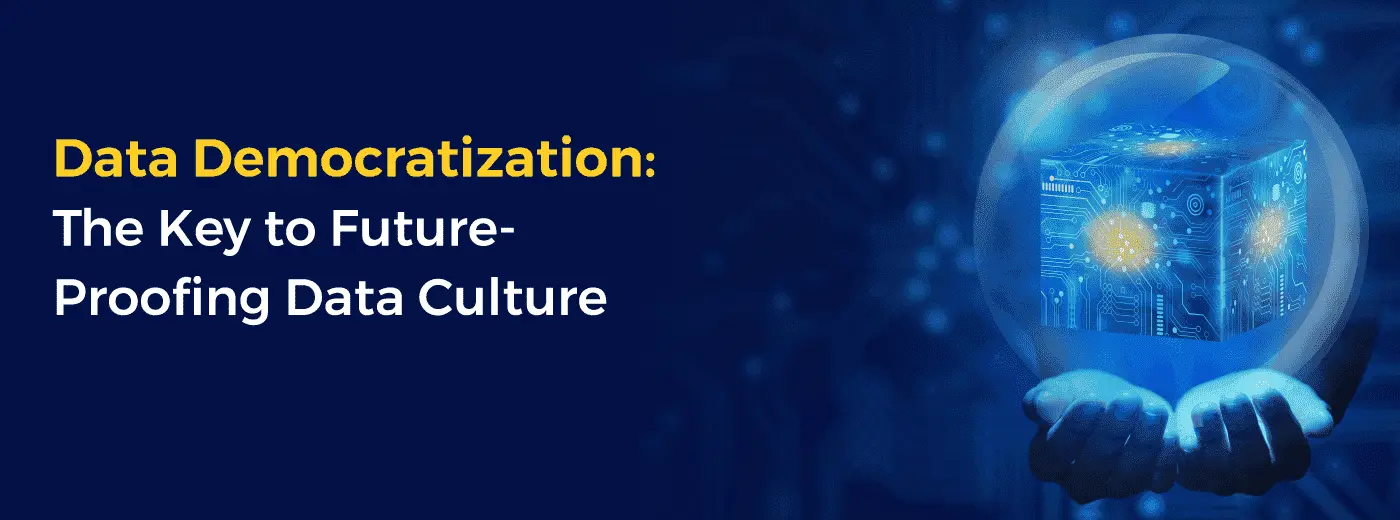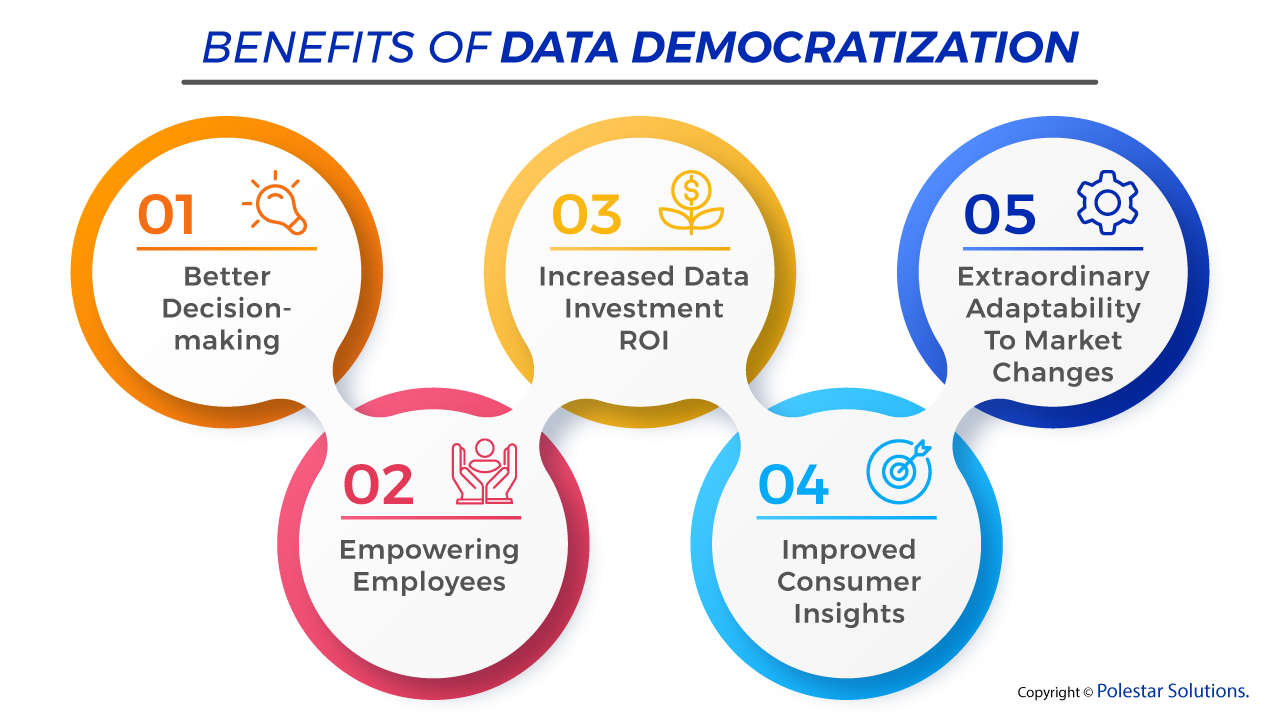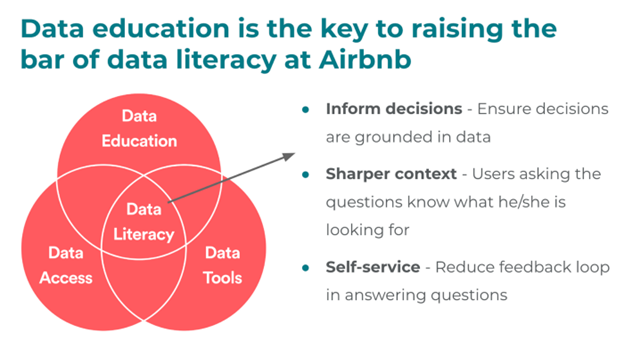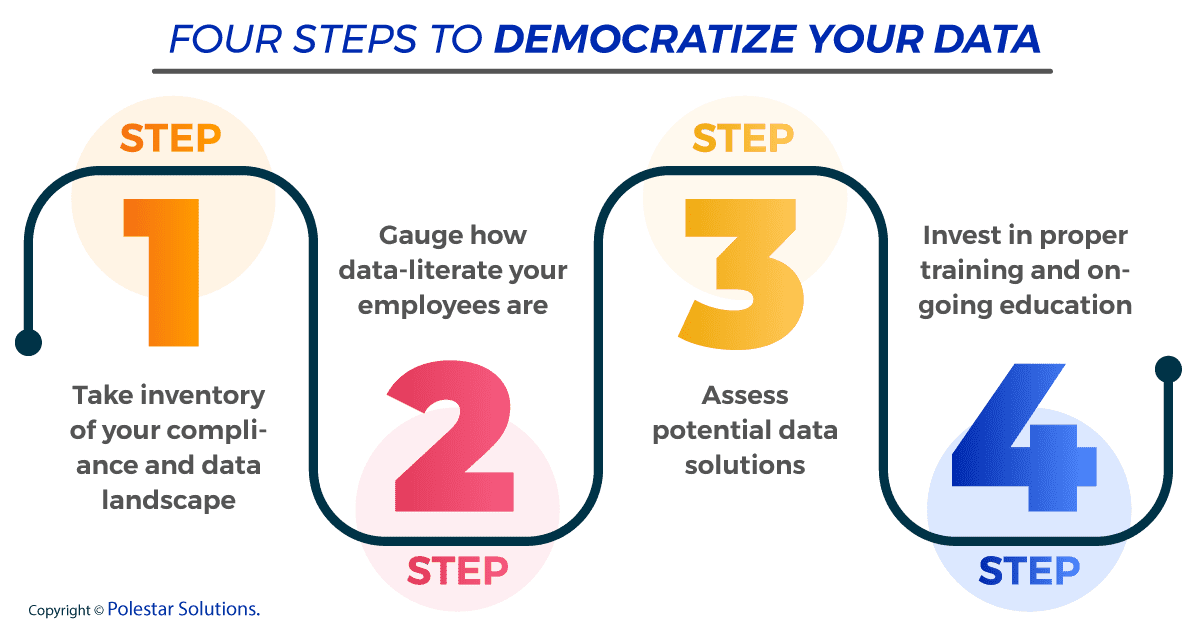
Sign up to receive latest insights & updates in technology, AI & data analytics, data science, & innovations from Polestar Analytics.
In the Information Age, the power of data has been mostly kept in a few data analysts with the understanding and skills necessary to organize, crunch properly, and interpret the data for their organization. This approach was born out of necessity — most employees were not trained to effectively utilize the growing flood of data.
But things have transformed with the emergence of technologies capable of making data shareable and interpretable for non-data analysts. Data democratization allows data to pass safely from the hands of a few analysts into the hands of the masses within a company.
Google search “What is data democratization" and you will see the best results talking about "access to data'' as the primary objective of the democratization of data.
But, just giving data access—whether as raw data in a data warehouse or as incredible visualizations inside product analytics tools or a business intelligence (BI) tool—is certainly not data democratization.
So what is it?
“Data democratization is the ongoing process of allowing everybody in an organization, irrespective of their technical know-how, to work with data easily, to feel confident talking about it, and, as a result, to make data-informed decisions and build customer experiences powered by data.”
Have you ever thought - Why do organizations care so much about democratizing data? Making it a reality is a serious investment— implementing tools, educating employees, and managing change are not minor undertakings.
In a nutshell, data democratization is all about resolving the data complexities people face daily. And with the pace of change in the data landscape and people's requirements, even the potential data teams struggle to meet the belief of numerous teams.
Our Business Intelligence solutions for informed decision-making help clients understand how to interpret different forms of data, identify what’s relevant, generate insights and present their findings in an effective manner.
Companies that don't give their employees adequate access to data (or education on how to use it) face many inefficiencies. These inefficiencies are caused by the following:
Siloed Data: When data is siloed across the company, stored in disparate enterprise apps, data lakes, and data warehouses, it is nearly impossible for a user to know where to search the data they require to do the job.
Controlled access to data: While controlling access to data is essential from a governance point of view, if only IT has access to the data, it can create complexities. In this scenario, once a business user figures out the data they need, they must go to IT for approval to utilize the data, which cuts down the time to insight.
Insufficient tooling: Numerous data intelligence tools are not designed for self-service analytics. In some organizations, only IT can access data and data intelligence tools. That means business analysts must go to IT to avail the data they require rather than having the capability to access data at a level appropriate to their role.
These issues are all caused due to lack of access to the data. Data democratization solves this issue by giving all users within the business access to the data they require to get the job done. It terminated the "middleman" of the IT department by giving employees secure access to self-service analytics that help them make data-driven decisions.

99% of business leaders say they see benefits once data democratization is underway.
Organizations that understand and successfully address the glitches highlighted will more clearly see the advantages of data democratization. Here are some advantages of it:Better decision-making: By capitalizing on present trends and consumer demands, businesses may profit from a first-to-market position. All workers can easily access the data, enabling the enterprise to reach consistent and coordinated conclusions.
Empowering employees: With access to data, individuals and groups may tackle organizational issues with more affirmation. Making data disposable takes up almost half of the work data scientists are responsible for. Optimization of internal processes may save effort and time by refocusing data teams on more strategic endeavors.
Increased data investment ROI: You'll make the most of every data point you invest in if you equip everyone in your company to use data for making educated decisions.
Improved consumer insights: The consumers and market are well-documented in external data. Making more customer-focused choices due to a better understanding of data can improve and enhance your market share and result in better consumer experiences.
Extraordinary adaptability: The data will vary to reflect customer or market changes. After that, you can come up with preventative rather than reactionary decisions.
True data democratization needs to level the playing field between technical and non-technical users. To kickstart your data democratization journey, target these four areas:
Data discovery
Making it easy to discover data will decrease the time it takes from idea to action. Users across the companies should be able to find and request access to data quickly. And at the very least, contextual information and table names should be visible to all.
A modern data catalog with a Google-like search, quick filters, and a data profile can assist diverse users to locate data rapidly. For instance, Lyft's new data discovery application reduced how long it takes to find data by 95%.
Data exploration
Both no-code and coded tools to explore data can assist users start answering questions using data themselves. This takes the burden of essential data exploration and reporting off data engineers and scientists' shoulders.
For instance, Uber empowered their employees to discover, explore, and utilize data effectively by giving them easy-to-use data exploration tools.
Data experimentation
Data scientists and engineers can only use the most advanced data tools. But what if they could open them up to data novices? Giving business users access to the newest data superpowers allows them to experiment with data and turn it into new actionable ideas and insights.
For instance, Airbnb's advanced data training lets business users curate dashboards and localized solutions that data scientists would never have had the bandwidth to build. Data scientists witnessed a 50% decrease in ad-hoc requests, while 80% of trained team members utilized data tools regularly.

Data automation
Data automation can make data easy for everyone by reducing manual data work. Enterprises should empower teams to automate their reporting workflows and reduce tedious human work. AI bots can be utilized to auto-classify data or suggest glossary terms.
For instance, at Airbnb, people's enthusiasm and productivity for working with data multiplied as soon as they started automating their data workflows through Airflow. The amount of time spent on troubleshooting and monitoring has decreased significantly.Now that you know the strategic approach, let's understand how to implement it in the organization.

So, how do you implement data democratization? What does the process look like? Here's an overview that you can adapt to the specific requirements of your enterprise:
Take inventory of your compliance and data landscape
Where is data housed? In the cloud, on-premise, or a mix of both? Which technologies and software tools are you currently utilizing to store, capture, and analyze data? If you are an enterprise organization, you may want to enlist the help of an IT consultant to provide a complete gap analysis.
Gauge how data-literate your employees are
Depending on your organization's needs, this may need something as simple as a quiz or as challenging as an assessment from a reliable third-party consultant.
Assess potential data solutions
Utilize technology review sites, ask your colleagues, and book demos of robust business intelligence tools to witness what might work best for your organization. Consider each potential tool's budget, customer service reputation, scalability, and market prominence.
Invest in proper training and ongoing education
Once you have implemented a new data democratization toolset, do not leave your team in the dark. Ongoing training and check-ins are just as necessary as initial onboarding to guarantee you see a solid return on your investment and begin to reap the benefits of data democratization.
Use software to help you.
Even small enterprises produce a considerable amount of data each day. These enterprises look to use this data to innovate and grow. However, with data spread across the organization and trapped in silos, it can be challenging to make data-driven decisions. As a result, many large enterprises look to tools like a data catalog to enable data democratization across their business.
Opt for agnostic products and solutions.
Agnostic solutions are interoperable among disparate systems and platforms, giving you more flexibility as your organization grows and changes.
Think long-term.
While there may be temporary cost-savings with some robust solutions, study the features and functionalities of your possible data solutions to ensure they'll still work for you five or ten years down the line.
Involve your employees.
Choosing tools and processes that your employees will use would be best. There's no apt way to gauge buy-in from your team members than to involve them in the process.
Consider user experience when evaluating solutions.
Data science can be intricate, but your analytics platform shouldn't be. Book demos of different tools and involve your team to determine which solutions make it easy to navigate, analyze, and run reports.
Therefore, it can be stated that Data democratization is the future of managing big data and realizing its value. Businesses with the correct tools and understanding are succeeding today because they are arming all their employees with the knowledge necessary to make intelligent decisions and provide better customer experiences.
At Polestar Analytics, we democratize data at scale while ensuring your data is secure and compliant. Our governance capabilities and data stewardship can create policies to protect an organization's data from misuse. Book a demo with us today
About Author

Content Architect
The goal is to turn data into information, and information into insights.